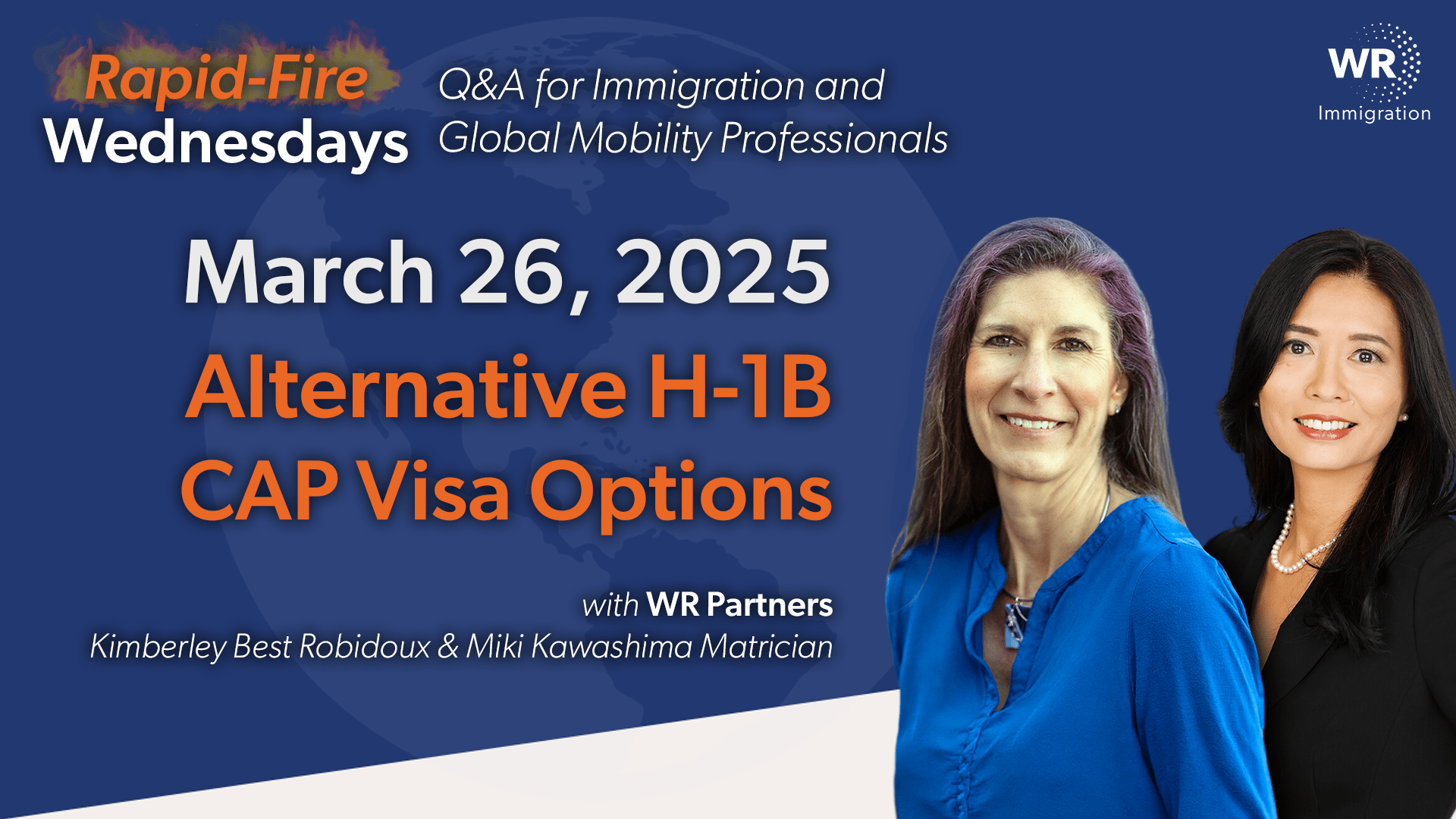The transcript version of our weekly Q&A livestream for corporate immigration professionals. Join our Immigration News Digest Newsletter for more immigration updates.
By Kimberley (Best) Robidoux & Miki Kawashima Matrician
🔥 Question: What happens now that the H-1B CAP registration window has closed?
Response: USCIS will run its randomized, computer-generated lottery by March 31st. Employers will then file H-1B petitions for selected foreign nationals from April 1st through June 30th. At the end of that period, USCIS will review how many cases were received to determine if the quota was met. If it hasn’t been met, another lottery drawing will be conducted based strictly on the March registrations.
🔥 Question: What are the alternative options for individuals not selected in the H-1B CAP lottery?
Response: Individuals on F1 OPT valid until after April 1st, 2026, can continue working on their OPT. However, there are other considerations for those who may not have work authorization beyond that date.
🔥 Question: What options exist for individuals married to visa holders?
Response: If the employee is married to an H-1B visa holder with an approved I-140 immigrant visa petition, they can file for an H-4 employment authorization document (EAD). If they are married to someone in L-1 or E visa status, they can work without filing an EAD application, provided their I-94 states L2S, E1S, or E2S.
🔥 Question: Can individuals explore employment with a CAP-exempt organization?
Response: Yes, certain employers, such as universities, nonprofit organizations affiliated with universities, nonprofit research organizations, and government research organizations, are not subject to the H-1B CAP. Individuals can work part-time for a CAP-exempt organization while also working for a private employer under concurrent employment. However, if they stop working for the CAP-exempt institution, they would need to be selected in the lottery to continue working under H-1B status for the CAP-subject employer.
🔥 Question: What are the alternative options for individuals from countries with certain free trade agreements with the U.S.?
Response: Citizens of Chile, Singapore, and Australia may qualify for H-1B1 (Singapore and Chile) or E-3 (Australia) visas, which function similarly to the H-1B but with some different provisions. These visas require a specialty occupation, a relevant bachelor’s degree, and wage obligations. Additionally, Canadian and Mexican nationals may qualify for TN visas under the United States Mexico Canada Agreement (USMCA), provided their role falls under one of the 63 occupational categories listed in the treaty.
🔥 Question: How can treaty trader and treaty investor visas be an alternative?
Response: The E-1 treaty trader and E-2 investor visas are available if a foreign national is from certain countries that have a commerce and navigation treaty with the U.S. If a publicly traded company is headquartered abroad and listed on a foreign stock exchange, its employees may qualify. For privately owned companies, at least 50% ownership by nationals of the employee’s country is required. The foreign national must be an executive, supervisory level, or essential skills worker.
🔥 Question: What about the O-1 visa for individuals with extraordinary ability?
Response: The O-1 visa is an option for individuals recognized nationally or internationally in their field. However, it has a high eligibility bar. Simply holding a PhD is not sufficient; applicants must demonstrate exceptional accomplishments, such as receiving national or international awards or meeting at least three specific USCIS criteria. This visa is generally not an option for early-career professionals but can be a long-term strategy for those looking to build their qualifications.
🔥 Question: Are there training visa options for companies wanting to train employees in the U.S.?
Response: The H-3 visa is available for structured training programs with a classroom component, though it is highly scrutinized by USCIS. The J-1 exchange visitor visa is another option for trainees. To qualify, individuals must meet specific requirements depending on the type pf exchange visitor program. However, some J-1 visa holders may be subject to a two-year foreign residency requirement before returning to the U.S.
Send us your questions via DM or using the below link!
HR Question Submission Form | Rapid-Fire Wednesdays
See you next week!


